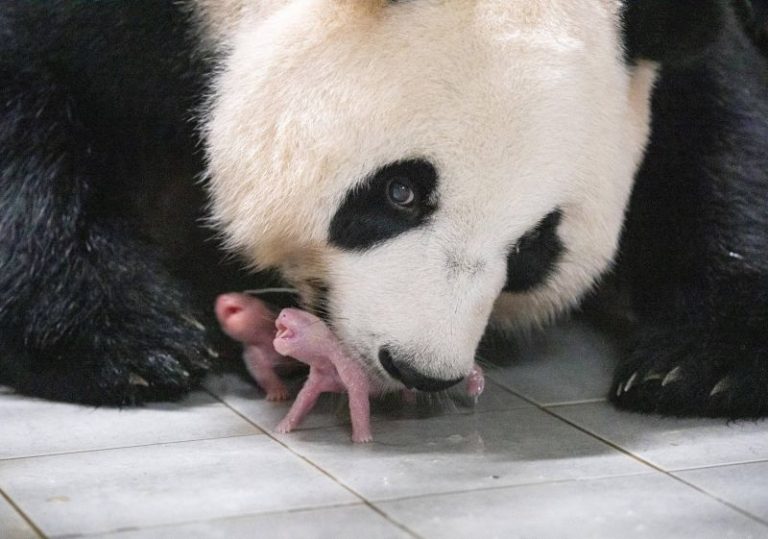A giant panda at a South Korean zoo has given birth to the country’s first twin cubs.
The palm-sized female pandas were born at the Everland Resort theme park southeast of the capital Seoul on July 7, the zoo said in a statement Tuesday.
Video posted to YouTube showed their mother Ai Bao picking up the first cub, weighing 180 grams (6 ounces), with her mouth, then delivering the second cub, weighing 140 grams, an hour later.
The twins’ birth is considered rare – there’s less than a 50% chance of pandas giving birth to twins – and in the wild, they struggle to survive as mothers can often only care for one of their cubs.
Both the mother and her offspring are in good health, the zoo said in a statement, with staff providing postpartum care based on their experience helping the now 9-year-old deliver her first cub, Fu Bao, three years ago.
“I am very happy that twin baby pandas were born for the first time in Korea,” said Kang Cheol-won, a zookeeper responsible for setting up the panda enclosure at the park. “I will continue to take good care of them so that they can become a panda family that will deliver hope and joy to the public.”
The mammals, known for their penchant for bamboo, are native to China and deemed a “national treasure.”
For decades, Beijing has been sent them abroad as ambassadors to show goodwill in what is known as “panda diplomacy.”
The twins’ parents, Ai Bao and father Le Bao, were loaned to South Korea in 2016 and went on to deliver Fu Bao, the first locally born panda in 2020. The new twins are yet to be named.
Jung Dong-hee, director of Everland Zoo, called the birth of the pandas “another important achievement from the cooperation between Korea and China on panda research.”
Giant pandas have one fertile period throughout the year, lasting just one to three days each time, and their preference to live alone in their natural habitats means they rarely mate.
Given the challenge, the zoo said it had analyzed hormonal changes among the pandas to search for the best mating window, and observed the behavioral changes of the mother after she became pregnant.
It is estimated that around 1,800 pandas remain in the wild, mostly in the mountains of Sichuan, western China.
Beijing currently loans its pandas to about 20 countries.

